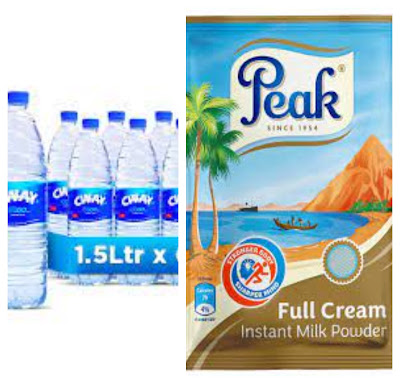Despite being circulated nationwide for public consumption, companies producing Cway Water, Golden Penny Spaghetti, Peak Milk Powder, and other widely-consumed products failed to renew their operational licences from the National Agency for Food, Drug Administration and Control (NAFDAC), a report by The ICIR has revealed.
Findings by The ICIR showed that the approvals previously granted to the companies manufacturing these products have expired. This means the NAFDAC might have failed to re-assess the products and the environment under which they are produced.
The NAFDAC regulates and controls the manufacture, importation, exportation, advertisement, distribution, sale and use of food, drugs, cosmetics, medical devices, chemicals and packaged water in Nigeria.
According to the NAFDAC Act 2004, no food product or packaged water shall be manufactured, imported, exported, advertised, sold, distributed or used in Nigeria unless registered and approved by the agency.
The act provides that any manufacturer of consumables must apply for certification from the agency. The certificate of registration shall be valid for five years and should be renewed immediately after expiration.
According to the act, any company or individual found violating the regulation may be banned from engaging in the importation, exportation, manufacture, distribution, sale, or use of the food product. Additionally, they may be subject to a fine of N50,000.
According to the report, checks were carried out on some selected widely consumed products in Nigeria on the agency’s website and sent an FOI to the organisation for further verification.
Five of the 14 selected product samples sent to NAFDAC for verification have not renewed their licenses.
It was also gathered that this negligence by NAFDAC and the firms posed a threat to public health.
Cway Water
Findings revealed that Cway Ultra Park drinking water, a popular bottled water brand in Nigeria, lacks a valid NAFDAC licence. The manufacturer, Cway Nigeria Drinking Water Science and Technology Limited, based in Lagos state, registered the product in 2017 under number 01-3892, but the registration expired in 2022. Despite this, the company has continued selling the product nationwide.
Eva Water
Similarly, Eva Table Water, owned by Nigeria Bottling Company in Lagos, operates illegally without due certification. The certificate with the registration number 01-0492 issued to the company for its production and sale in February 2013 has expired since 2018.
Peak Milk Powder
Another product being sold across the country with expired certification is Peak Milk Powder, a popular brand of instant milk powder in Nigeria, produced by FrieslandCampina, a Dutch multinational dairy company. Findings by The ICIR show that the certification for the product expired in 2020.
Golden Penny Spaghetti
Golden Penny Spaghetti is produced by Flour Mills of Nigeria Plc, a food and agro-allied company in Nigeria. Flour Mills of Nigeria Plc was established in 1960, making it a longstanding player in the Nigerian food industry. The document revealed that the approval for the product expired in 2018, even though the product could be found in almost every Nigerian market.
Gino magic season tomato mix
The tomato mix is widely used for cooking various dishes in Nigerian homes. Produced by Conserveria Africana Limited in Lagos state, the company has failed to update its approval since June 2022.
| PRODUCT | NAFDAC NO | Manufacturer | APPROVED DATE | EXPIRY DATE | |
| Cway Ultra Park Water | D1-7020 | Cway Nigeria Limited | 6/9/2018 | 9/5/2020 | |
| Peak Milk Powder | 01-0274 | Friesland Campina Wamco Nigeria Limited | 1/29/2015 | 1/28/2020 | |
| Golden Penny Spaghetti | 01-0291 | Golden Pasta and co. Ltd | 8/1/2013 | 8/1/2018 | |
| Gino Tomato Mix | 08-6288 | Conserveria Africana Ltd | 6/2/2017 | 6/1/2022 | |
| Eva Table Water | 01-0492 | Nigeria Bottling Company | 2/5/2013 | 2/4/2018 |
In an interview with The ICIR, Malomo Olusola, a chief dietitian at Ajeromi Hospital in Lagos, explained that the essence of the renewal of licences was to ensure that manufacturers did not alter the standard. He noted that the proliferation of unlicensed products could cause severe danger to the public.
“It’s crucial to acknowledge that the products are not safe. Why do we have a protocol for bringing back certificates and samples? It’s for quality control. The NAFDAC is the agency that regulates a product in terms of quality control. It is part of the guidelines for receiving a NAFDAC number or approval that companies must periodically bring samples for evaluation.
“When a company doesn’t come for an assessment and their license expires, who guarantees the quality of such products? This is particularly critical for food products, as it directly impacts the well-being of individuals. Quality control ensures that the company will be on its toes to ensure the consistency of quality that was earlier approved. If approved samples are not brought for re-assessment, it becomes uncertain whether the same quality used yesterday is maintained today.”
Malomo explained that there were manufacturers who might attempt to take shortcuts, and in doing so, the assurance of quality could be compromised, leading to a decline in the quality and overall qualitative value of the content.
“Now, I’m not particularly concerned about expired products. Those can be discarded. What’s alarming is when the license is not renewed, and production continues. The expiry date will not reflect the actual time the license expires. For instance, if your license is supposed to expire in 2023, but you continue production in 2026 without renewal, the stated expiry date on the product will not show that the company is not licensed.
Malomo argued that NAFDAC’s failure to enforce compliance means the public would continue to consume potentially unsafe products, which might cause significant harm to the well-being of the public.
The dietician added that if an issue is identified later, NAFDAC might need to order the product to be withdrawn from the market. However, a substantial quantity of these products could already be in circulation by that point.
“Imagine a scenario like contaminated water entering the market and being distributed to a large gathering, such as a wedding with 1,500 guests from all over Nigeria. Look at how harmful that could be.”
He said that even though some renowned companies might claim they have internal quality control measures, there’s a need for peer review by a regulatory body like NAFDAC to ensure checks and balances.
NAFDAC’s Misleading database
NAFDAC maintains a publicly accessible online database containing all approved food and drug manufacturing companies in Nigeria and regularly updates the portal with information about the approval status of various products in Nigeria in line with its mandate.
The database tagged Registered Products Automated Database (NARPAD) collates and keeps data on all registered products in an automated database accessible electronically to designated users.
A Freedom of Information request filed by The ICIR revealed discrepancies between the information displayed on NAFDAC’s online portal and the agency’s official response.
The ICIR ran a search on some selected products and filed a freedom of information request to NAFDAC to confirm the accuracy of the information displayed on the agency’s portal. The information provided in the FOI response largely contradicts the data on the portal.
For instance, according to the database, the approval for Dangote bread flour expired in June 2022, but the FOI response says the approval is valid till August 2025. The database also states that the approval for the Nescafe Classic Pure Instant Coffee expired in August 2022, while the FOI response reveals that it is valid till 2028.
This discrepancy led to confusion when the Foundation for Investigative Journalism reported no proof of NAFDAC registering Nagiko Tomato Mix, manufactured by Erisco Foods Limited. The organisation reached this conclusion after searching the agency’s database and failing to locate the product.
This occurred after a Facebook user, Chioma Egodi, posted a negative review about the product, alleging high sugar content. The review led to a legal tussle between the reviewer and the company, who argued that the review was defamatory.
The NAFDAC later clarified that the product received its registration in 2021 but had not been updated on its database due to a backlog issue. The agency said it was actively updating the portal.
It also presented the registration certificate issued to Erisco Foods for Nagiko Tomato Mix, saying that the certificate issued to the company on February 25, 2021, remained valid until February 24, 2026. However, The ICIR‘s investigation reveals that NAFDAC has not consistently uploaded various certified products, and some of those that have been uploaded contain inaccuracies in their details.
NAFDAC spokesperson Christy Obiazikwor was quoted to have said that the agency was beefing up its post-market surveillance to ensure that manufacturers without updated certifications and distributors of expired products are sanctioned.
Source: icirnigeria




















